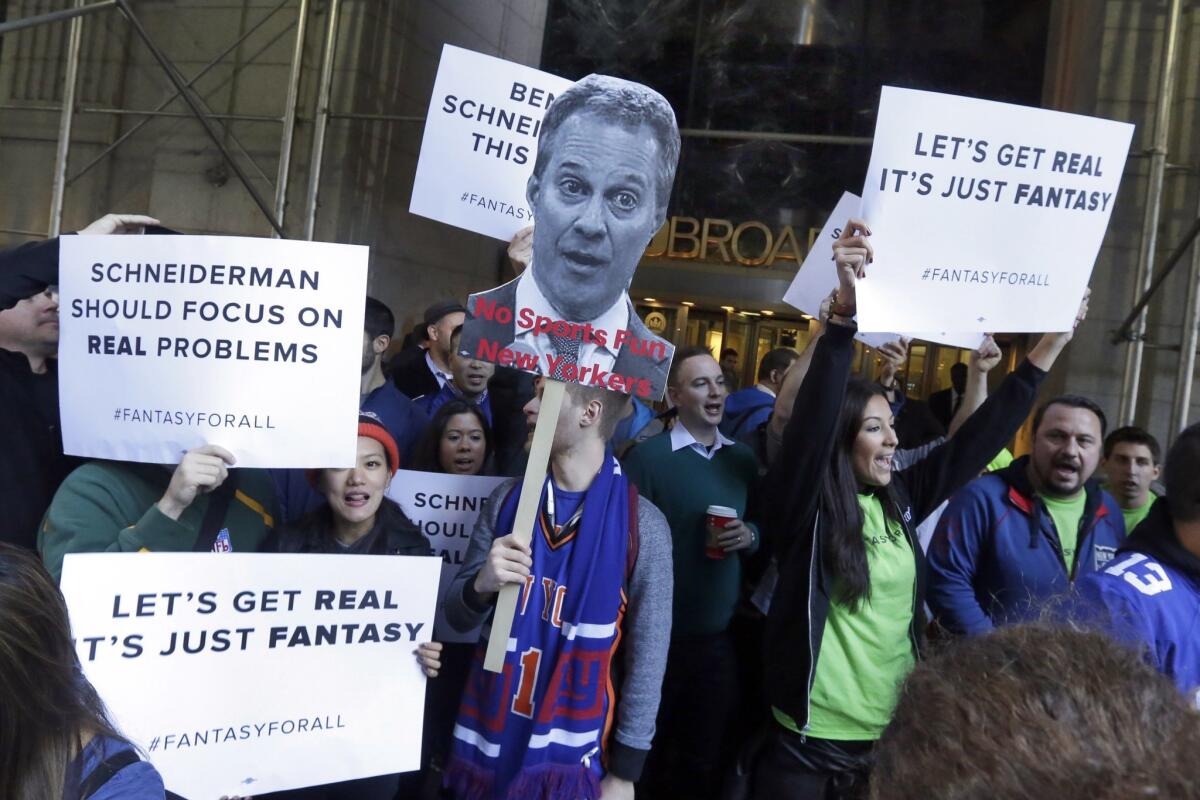States crack down on fantasy sports, calling them games of chance, not skill

Fantasy sports fans in New York City demonstrate outside the offices of New York Atty. Gen. Eric Schneiderman in November. Schneiderman said that month that the daily fantasy sports betting sites FanDuel and DraftKings are illegal gambling operations in his state.
The livelihood of a billion-dollar industry largely rests on a single question: Are daily fantasy sports a game of chance or a game of skill?
It’s true, Illinois Atty. Gen. Lisa Madigan said, that predicting which athletes will perform best on any given day requires skill. But the actual competition is still left to the athletes — the fantasy gamers have no control over the outcome.
As a result, Madigan said in an opinion, fantasy sports are games of chance and therefore illegal under Illinois law.
Illinois then became the third state to ban daily fantasy sports sites outright, and the eighth state in which the sites do not operate because of existing regulations.
“Persons whose wagers depend upon how particular, selected athletes perform in actual sporting events stand in no different stead than persons who wager on the outcome of any sporting event in which they are not participants,” Madigan wrote in her opinion released Dec. 23.
Daily fantasy sports are essentially run by two companies, DraftKings and FanDuel, which dominate more than 90% of the market. They operate by awarding money to lineups of players in various sports chosen by the gamer. (Both companies have filed lawsuits challenging Illinois’ action.)
Nevada, where gambling interests have their own revenue to protect, in October became the first state to issue an outright ban.
The state attorney general’s office, in a memo to the Nevada Gaming Control Board, wrote: “In short, daily fantasy sports constitute sports pools and gambling games. They may also constitute lotteries, depending on the test applied by the Nevada Supreme Court. As a result, pay-to-play daily fantasy sports cannot be offered in Nevada without licensure.”
A month later, New York followed suit.
New York Atty. Gen. General Schneiderman argued that the activities of fantasy sports sites are “causing the same kinds of social and economic harms as other forms of illegal gambling, and misleading New York consumers.”
In a statement, Schneiderman added, “Daily fantasy sports is neither victimless nor harmless, and it is clear that DraftKings and FanDuel are the leaders of a massive, multibillion-dollar scheme intended to evade the law and fleece sports fans across the country. Today we have sent a clear message: not in New York, and not on my watch.”
Schneiderman, in a Nov. 10 letter to DraftKings, noted what he called a “critical distinction” between daily fantasy sports and “traditional fantasy sports, which, since their rise to popularity in the 1980s, have been enjoyed and legally played by millions of New York residents.”
In the traditional fantasy sports setting, he wrote, participants conduct a competitive draft, compete over a long season and make adjustments to their teams. “They play for bragging rights or side wagers, and the Internet sites that host traditional fantasy sports receive most of their revenue from administrative fees and advertising, rather than profiting principally from gambling,” he wrote.
DraftKings and similar sites, however, are in full control of the wagering and profit directly from those wagers, Schneiderman wrote.
On Thursday, the Associated Press reported, Schneiderman filed a lawsuit asking DraftKings and FanDuel to reimburse users who lost money in 2015 and pay a fine of up to $5,000 per case. A DraftKings attorney called the suit baseless, and FanDuel declined to comment, the AP reported.
Most states have laws that address gambling, but in states where there are no laws concerning fantasy sports, regulators must balance skill and chance.
In many states, the law permits games that depend more on skill than chance. A few states, like New York, ban all games that are “materially affected” by chance. Others ban games if chance is any factor at all.
Winning at daily fantasy sports did, apparently, involve some skill, though not the kind the sites would hope for.
In fantasy sports, the key to victory is to pick players who score lots of points. But everyone will choose the predictable high-scorers like Pro Bowl quarterbacks and league-leading home run hitters.
To separate themselves from the pack, gamers must find an ideal points-to-rarity ratio, in which the best athletes are those who score lots of points and aren’t chosen by other gamers. The least-chosen athlete with the most points is, therefore, the most valuable.
So in September, it was a scandal when a DraftKings employee accidentally released data that ranked players based on their rareness-to-points ratio. Such a release of nonpublic information could be of tremendous use to players trying to acquire players who will generate the most points without being picked by others.
The employee, Ethan Haskell, was prohibited from playing on DraftKings, his employer, but nothing stopped him from playing at Fan Duel, with DraftKings’ data, to which only DraftKings employees had access. He won $350,000.
Such a use of proprietary data raised accusations that equated the scandal to insider trading. After the leak, daily fantasy players told media outlets that they were contacted by the FBI as part of a potential investigation into the practices of daily fantasy sports sites.
Comedian Bill Burr encountered the issue of gambling versus skill on his podcast, the Monday Morning Podcast, when DraftKings bought advertising over a months-long stretch.
During that time, Burr challenged the site even as he read the advertising copy. Noting Major League Baseball’s rigid opposition to gambling, Burr was incredulous when he read that the buttoned-up baseball organization was partnering with a daily fantasy sports site.
Blurting out an expletive, he added, “People, please be careful with this site. Only gamble what you can afford to lose. Don’t buy into their dumb commercials.”
DraftKings complained to Burr in a note he read on the podcast, asking him not to compare the site to gambling.
“If you don’t like it, go to another podcast,” Burr said.
DraftKings has not advertised with him since.
nigel.duara@latimes.com
More to Read
Sign up for Essential California
The most important California stories and recommendations in your inbox every morning.
You may occasionally receive promotional content from the Los Angeles Times.











